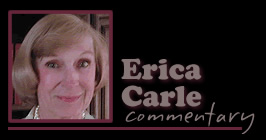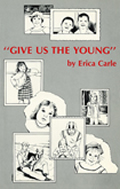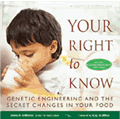PART 1
Erica Carle
November 7, 2009
NewsWithViews.com
Arousing Curiosity and Suggesting Experimentation
Forbid as little as possible, for to forbid is to suggest the thing forbidden. -J. L. Spalding
It should have been no surprise to anyone when drug education courses served only to arouse curiosity and promote experimentation on the part of children exposed to them. You don't discuss a subject day-in and day-out if you want children to stop thinking about it.
To this day if I try to explain the danger of drug education courses to those who are lamenting the "drug problem," the majority will respond with nothing but a dumb smile. Then they will anxiously try to change the subject. Why do so many people want to evade the truth? Were they among the experimenters of the '70s?
Perhaps there is someone reading this now who does want to know what happened and is happening to the children. For you, I am going to reveal the stupid ideas and programs that were sold to parents as attempts to solve the "drug problem" nearly forty years ago. I recorded my experiences in several "Truth In Education" columns between 1973 and 1976.
FROM: "Truth In Education"-- December 20, 1973:
During this fall term large numbers of children in both Wauwatosa and Waukesha schools have been arrested and/or expelled for drug use. The Mayor of Wauwatosa is appointing a committee to look into the matter and see if solutions can be found. I think he is sincere, but I hope he and the committee, and whoever looks into the matter in Waukesha, will have the courage to face the truth when it finally hits them. The schools have been and are now corrupting the children. No amount of stern treatment of offenders, no amount of investigation of pushers will do any good until the schools themselves stop teaching corruption.
Last month when a member of the school board in Wauwatosa told those who attended a public meeting that a number of pupils had been expelled from one of the Junior Highs, he deplored the fact that the parents wanted the school board to be more lenient. He also wondered why a physician-parent didn't keep closer track of his medical supplies. He wondered why parents didn't watch their children more closely. It was a good talk, and he was right.
But I was fooled. Thinking the board really wanted to get to the bottom of the problem, I decided to speak. I acknowledged that it is sometimes difficult for parents to see what is right in front of them.
It is often hardest for all of us to see what is closest to us. Then I suggested the same might apply to the school board – that it might be possible that some of the teaching materials used in the schools could have a harmful effect on the children. I even suggested parents might help if the board would appoint a committee of parents to look into teaching materials and report back on what they found.
That, my friends, is when the room turned cold and I became the enemy invader. The board members put me down in no uncertain terms. A parent stood up all pious and self-righteous and said he didn't want the books his children read in the schools censored by a bunch of parents. People smiled approval and there was some applause. Not one person who was at the meeting spoke to me after it was over.
Dear God, what faith they have! What blind faith!
The very next day a Junior High student gave me a book from the school library. It was called, We Were Hooked. Look for it in your school library. Check pages 16, 64, 92, 133 or read the entire book. It was so corrupting, so much an example of the type of thing I knew existed that I distributed copies of the most vile quotes to school board members at the regular board meeting the following Monday. They were shocked and promised to have the book removed the next morning, which they did.
But that doesn't settle the matter. There are more – not all quite so blatant and corrupting, but there are many books in the Junior High School libraries that give a complete catalogue of the drugs available and a description of the effects of each. There are books that show all the equipment necessary for injections, and there are books that show drug addicts actually injecting themselves.
There are books that take a neutral attitude toward the drug scene, and there are books whose main point is that marijuana should be legalized. There are books that suggest the most important reason for getting off drugs is to be in a better condition for 'social activism;' and there are books that suggest Yoga, Zen Buddhism, and sensitivity sessions as substitute "highs." Is this what is called drug education? Perhaps it is properly named. It certainly can't be anti-drug education.
Junior High children do not need long explanations and descriptions of various drugs and the techniques for using them. If it is absolutely necessary children should be told that drugs are forbidden, but even this is dangerous for to forbid is to suggest.
Bishop J. L. Spalding, in a marvelous book of aphorisms and reflections published in 1901 made a very wise observation. He wrote, "It is good to know a thing, but there are things which the young and imperfectly educated can not know, and the attempt to give them what they are not prepared to receive will but confuse or pervert them."
FROM: "Truth In Education" – February 21, 1974
It Looks Like A Home Talent Show
Have you ever seen a professionally produced home talent show? I've seen quite a few because I used to direct them. The director comes to town with the scripts, a suitcase full of costumes, and the know-how to put it all together. An organization in the town supplies the workers and introductions to local people so a cast and chorus can be recruited, advertising sold, and publicity obtained.
The script and mode of operation are the same in every town visited, but the parts are filled locally. The participants in each town have the feeling that their show is unique, but after the show is over the director travels to the next assignment and puts on another show that is essentially the same.
Last week I saw a home talent show shaping up. It wasn't called a home talent show. It was called a 'meeting of the mayor's Blue Ribbon Commission to study drug abuse. ' The mode of operation was totally familiar. However, the goal is not fun and entertainment. It is a money-exchanging, organizing, power-grabbing promotion whose publicly announced purpose is to 'examine the extent of the growing drug problem and ways to reduce it.'
To put together such a home talent show requires some informed and a good deal of uninformed cooperation in the local community. It also takes pre-planning and scripting in the home office of the production company. (In this case the Department of Health, Education and Welfare) The producers have to be prepared to move in with personnel at exactly the right moment.
The right moment is after a spectacular incident. A good kick-off incident is the arrest or expulsion from school of a large number of teen-aged drug experimenters. It is enough of an incident to get people aroused and interested, but doesn't look quite so ghoulish as to move in after a drug related death or really heart breaking mishap.
All elements have to be ready when signs indicate the time is ripe. First, someone puts a bug in the ear of a well-known official or public figure. The official recognizes the problem and gets lots of publicity with a suggestion to form a committee of citizens to combat it. The committee is appointed and sworn in with fanfare and publicity. The production is on its way!
The main characters in last week's episode were the public official, the newly appointed committee, two hired directors from the home office (HEW), various reporters and interested spectators.
The home office directors did most of the talking. After listening to them recite their lines and after re-reading a recent clipping from the MILWAUKEE JOURNAL I can give you some of the stated and unstated goals of the production. They are to:
1.
Increase home office (HEW) direction in the community
2. Pressure schools into giving students more and earlier
instruction on the uses and sources of various drugs
3. Have local police enter regional arrangements and
submit to more federal direction
4. Pressure local businesses to submit to drug abuse
programs for employees
5. Exert pressure to legalize marijuana
6. Establish centers for personal counseling
7. Get increased HEW funding for education
8. Gain support for 'child power'
9. Get more HEW control over prescription drugs
10. Form pressure groups using middle class problems
11. Popularize the HEW definition of drug abuse which
is:
|
Subscribe to the NewsWithViews Daily News Alerts! |
Drug abuse is behavior, so designated by professionals and other community representatives describing the use of particular drugs in particular ways for particular reasons which are contrary to the agreed upon rituals in a given community at a given point in time. The designation is completely arbitrary, but, once having been made, the plans for intervening in a person's life style are considered to be necessary and rational.
Click here for part -----> 1, 2, 3, 4, 5,
[Read Erica Carle's books: Why Things Are The Way They Are. and "Give Us The Young"]
� 2009 Erica Carle - All Rights Reserved
Sign
Up For Free E-Mail Alerts
E-Mails are used strictly for NWVs alerts, not for
sale
Erica Carle is an independent researcher and writer. She has a B.S. degree from the University of Wisconsin. She has been involved in radio and television writing and production, and has also taught math and composition at the private school her children attended in Brookfield, Wisconsin. For ten years she wrote a weekly column, "Truth In Education" for WISCONSIN REPORT, and served as Education Editor for that publication.
Website: EricaCarle.com
E-mail: hist.detective@yahoo.com
















